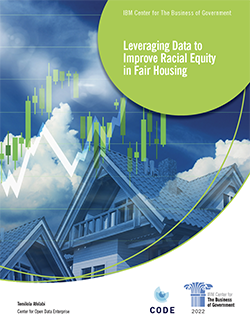
How Government Can Use Data to Improve Equity in Housing Programs

Housing is a cornerstone of wealth creation in the United States. Homeownership provides the ability to build wealth by acting as a forced savings mechanism through home value appreciation. Yet over the past 60 years, obstacles to homeownership have limited the ability of Black Americans and other communities of color to create wealth, and have had negative impacts on health and well-being, as well as inequalities in education, job opportunities, political power, access to credit, access to health care, and more.
Over time, federal efforts including the Fair Housing Act and Home Mortgage Disclosure Act have been designed to improve housing equity in the United States. While these laws have not been entirely effective, they have made new kinds of data available—data that can shed light on some of the historic drivers of housing inequity and help inform tailored solutions to their ongoing impact. Data has the power to reveal and address the challenges and opportunities in providing for equity and fairness across Federal housing programs, and to inform carefully tailored solutions.
In a new report, Leveraging Data to Improve Equity in Fair Housing, published jointly by the IBM Center for The Business of Government and the Center for Open Data Enterprise, author Temilola Afolabi explores a number of current opportunities to strengthen longstanding data-driven tools to address housing equity. The report also shows how the effects of mortgage lending discrimination and other historic practices are still being felt today. At the same time, the author outlines opportunities to apply data to increase equity in many areas related to the homeownership gap, including negative impacts on health and well-being, socioeconomic disparities, and housing insecurity.
This report makes several recommendations for how government can use high quality, granular, and easily accessible data to make improvements in equity for fair housing. Recommendations for potential outcomes include:
- Data-driven strategies. Actionable, data-driven strategies to improve and apply federal housing data sources
- Public-private collaboration. Inventory of high-priority, high-impact datasets and metrics to be developed further through public-private collaboration
- Data standards. Action plans for federal guidance and public-private collaboration to create better standards and data-sharing protocols for housing data
- Case studies. Examples of data analyses for policymakers and researchers to uncover racial discrimination and poor housing stock
- Creation of metrics and indicators. Proposed metrics to evaluate existing housing policies based on open data.
- Use cases. Collection of local use cases on housing reform to serve as models for housing policy nationwide
This report builds on the IBM Center’s recent work addressing how public administration can promote equity, which is one of the Center’s priority research areas. It is the second in a series of projects on Open Data for Racial Equity conducted in partnership with CODE. The first report in that series, Using Data to Advance Racial Equity in Healthcare, was published in August 2022. This new report provides helpful perspectives for government leaders and their stakeholders in designing effective strategies and programs that promote more equitable access to fair housing for all Americans.



